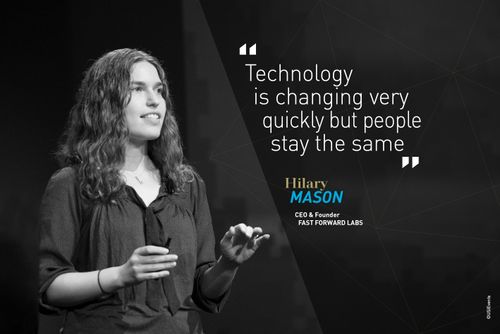Data in the service of innovation
If someone from the 1950s suddenly appeared, what would be the most difficult thing to explain to them about life today? The answer is certainly the following: "I possess a device in my pocket that is capable of accessing the entirety of information known to man, but I use it to look at pictures of cats and get in arguments with strangers"
An opening which Hilary Mason uses to assert that technology evolves very quickly whereas people stay the same, and human behavior stays the same.
Increasing amounts of data
"Data science" is not a new field. For years it has been applied in various sectors such as finance, insurance... But it has become so inexpensive that it is now possible for most people to use it and experiment with it, even for the most ridiculous ideas. And it has become cheaper to store data than to destroy them. Thus the amount of data continues to grow, thanks to three factors: access to cheap and powerful processors, algorithms and, of course, the data. Such are the developments behind the emergence of a new profession: "data scientist".
What makes a good data scientist?
There are several realities behind the term, and the scientist can just as well be a mathematician as an engineer. But a good data scientist has to be able to understand the problems that people need to solve. They must be capable of listening to a person with a sales or operational problem and to understand what the person wishes to accomplish before analyzing the data and available technologies to help solve the problem.
It is therefore someone with empathy and understanding of the worlds of business, technology and mathematics. What is new about the field is the fact that all these skills must be found in the same person.
"Designing a company for data"
Data are used in a wide variety of areas today such as optimizing the response time of ambulances or the route for a delivery vehicle. It is also very useful for gathering information on one's sleep patterns, sports activities, or to create applications like Google Traffic which works in real time thanks to the user data provided. But how does one design products of this type?
According to Hilary Mason, you have to have data analytics which stay the same over time to make comparison possible, and to well manage your staff and set priorities. Because very often mistakes happen because the data scientists are not the ones who set priorities.
"Process is usually a dirty word but it's not"
Hilary Mason shares a process which is easily applied to data science. For her the key to effective data is to ask the right questions!
- What problem are we really trying to solve?
- How will we know when we've succeeded?
- Supposing we've solved the problem perfectly, what is the first thing we will do with it?
- What impact will the technology have?
- What is the most evil thing that can be done with it? To answer that question, imagine you are someone else, an evil villain, and that you are plotting a diabolical act, what would you do with the technology?
- Where would you begin? To answer any of these questions, you need to know what data are available. And ask: what data should we have? What are our working hypotheses and what can we verify?
She further adds, "use the data to enhance your understanding of the world and your own business" as a way to improve your knowledge of your client base. Use those data to check your hypotheses and, if you obtain new information, use it! But you must not follow the data blindly.
Rapid evolution
The world of innovation and technologies moves fast. Whether in natural language generation, real time decision making or deep learning, the tools change very quickly.
In many cases, innovations have come out of start-ups. But in truth, Hilary Mason stresses, start-ups do not necessarily innovate. Much of the time, far from inventing new technologies, especially in the area of data, they use commodity technology to create new products. This is because, in general, the data are in the hands of data scientists working for major, long established companies.
What impacts do technologies have on the world? What are the effects of "data"?
Those are questions that data scientists are actively pursuing at the moment, namely in relation to ethics. Hilary Mason is not among those who think that artificial intelligence is dangerous. You do have to wonder "what kind of world does our new technology enable?" she says, "and what will be the impact on the people who use them? Because you actually do influence global human behavior".

